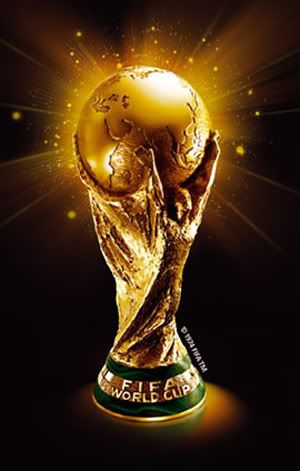The trophy, originally named Victory, but later renamed in honour of former FIFA president Jules Rimet, was made of gold plated sterling silver and lapis lazuli and depicted Nike, the Greek goddess of victory. Brazil won the trophy outright in 1970, prompting the commissioning of a replacement. The Jules Rimet Trophy was stolen in 1983 and never recovered. The replacement trophy, the FIFA World Cup Trophy, was first used in 1974. Made of 18 carat gold with a malachite base, it depicts two human figures holding up the Earth. The current holder of the trophy is Italy, winner of the 2006 World Cup
Jules Rimet Trophy 1930-1970
1

During World War II, the trophy was held by 1938 winners Italy. Ottorino Barassi, the Italian vice-president of FIFA and president of FIGC, secretly transported the trophy from a bank in Rome and hid it in a shoe-box under his bed to prevent the Nazis from taking it.[2]
On 20 March 1966, four months before the 1966 FIFA World Cup in England, the trophy was stolen during a public exhibition at Westminster Central Hall. The trophy was found just seven days later wrapped in newspaper at the bottom of a suburban garden hedge in Upper Norwood, South London, by a dog named Pickles.[3]
As a security measure, The Football Association secretly manufactured a replica of the trophy for use in the post-match celebrations. The replica was also used on subsequent occasions until 1970. The replica was sold at an auction in 1997 for £254,500, when it was purchased by FIFA. The high auction price, several times the reserve price of £20,000-£30,000, led to speculation that the auctioned trophy was not a replica, and was in fact genuine. However, subsequent testing by FIFA confirmed the auctioned trophy was indeed a replica. [4] Subsequent to the auction, FIFA arranged for the replica to be displayed at the English National Football Museum in Preston.
The Brazilian team won the tournament for the third time in 1970, allowing them to keep the real trophy in perpetuity, as had been stipulated by Jules Rimet in 1930.[5] However, the cup was stolen again on 19 December 1983, when it was taken from a display at the Brazilian Football Confederation headquarters in Rio de Janeiro. The trophy was kept in a cabinet with a front of rocket launcher-proof glass, but a rear made of wood was pried open with a crowbar.[6] The trophy was never recovered, which suggests it may have been melted down. Four men were eventually tried and convicted in absentia for the crime. The Confederation commissioned a replica of their own, made by Eastman Kodak, using 1.8 kg (3.97 lb) of gold. This replica was presented to the Brazilian president in 1984.[7]
FIFA World Cup Trophy 1974 - Present
A replacement trophy was commissioned by FIFA for the 1974 World Cup. Fifty-three submissions were received from sculptors in seven countries.[8] Italian artist Silvio Gazzaniga was awarded the commission. The trophy stands 36.5 centimetres (14.4 inches) tall and is made of 5 kg (11 lb) of 18 carat (75%) solid gold with a base (13 centimetres [5.1 inches] in diameter) containing two layers of malachite. Produced by Bertoni, Milano, it weighs 6.175 kg (13.6 lb) in total, depicts two human figures holding up the Earth. Gazzaniga described the trophy thus, "The lines spring out from the base, rising in spirals, stretching out to receive the world. From the remarkable dynamic tensions of the compact body of the sculpture rise the figures of two athletes at the stirring moment of victory."[8] It was first presented at the 1974 FIFA World Cup, to West German captain Franz Beckenbauer.[8]
The trophy has the visible engravement "FIFA World Cup" in outpouring letters at its base. The name of the country whose national team wins each tournament is engraved in the bottom side of the trophy, and therefore is not visible when the trophy is standing upright. The text states the year in figures and the name of winning nation in English,[9] for example "— 1994 Brazil". As of 2006 nine winners have been engraved on the base. It is not known whether FIFA will retire the trophy after all of the name plaques at the base are filled in; this will not occur until after the 2038 World Cup at the earliest. FIFA's regulations now state that the trophy, unlike its predecessor, cannot be won outright: the winners of the tournament receive a replica which is gold plated rather than solid gold.[8]








